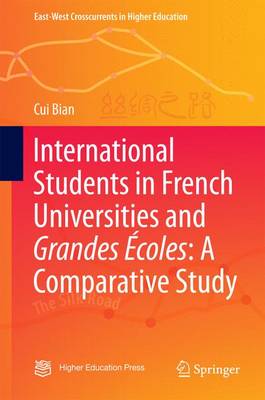East-West Crosscurrents in Higher Education
1 total work
International Students in French Universities and Grandes Ecoles: A Comparative Study
by Cui Bian
Published 31 August 2016
The book mainly investigates the challenges that confront France's unique dual system of higher education in facing internationalization and the recruitment of international students. This book focuses on the development of the institutional strategies in two groups of higher education institutions: University and Grande Ecole in responding to the opportunities and stresses of both Europe's Bologna process and globalization.
The research data presents in this book was collected from four local institutions, two Grandes Ecoles and two universities, one of each focusing on the social sciences and the other on natural sciences and technology. Interviews with major stakeholders in the institutions, including personnel from international offices, faculty/researchers and international students were adopted as principal methods for data collection. The thematic organization of the findings in each chapter covers views from three levels of stakeholders' and interprets the results within theoretical frames, such as institutional theories, world-system theory, international academic relationship theory and branding theory. Readers will find this book both practical and innovative in four key ways. Firstly, in knowledge diffusion, revealing the mysterious veil of the unique French dual higher education system. Secondly, in new knowledge production, exploring a new subject of research and filling the blanks from previous studies of the two groups of institutions. Thirdly, in presenting new interesting sights into current reforms in Frances's higher education and how far principles of path dependency will ensure strong continuities with the past as against a tendency to homogenization in response to pressures from Europeanization and global ranking systems. Finally, in exploring the dimension of interculturality and the interplay between researcher's identity and research process.
The research data presents in this book was collected from four local institutions, two Grandes Ecoles and two universities, one of each focusing on the social sciences and the other on natural sciences and technology. Interviews with major stakeholders in the institutions, including personnel from international offices, faculty/researchers and international students were adopted as principal methods for data collection. The thematic organization of the findings in each chapter covers views from three levels of stakeholders' and interprets the results within theoretical frames, such as institutional theories, world-system theory, international academic relationship theory and branding theory. Readers will find this book both practical and innovative in four key ways. Firstly, in knowledge diffusion, revealing the mysterious veil of the unique French dual higher education system. Secondly, in new knowledge production, exploring a new subject of research and filling the blanks from previous studies of the two groups of institutions. Thirdly, in presenting new interesting sights into current reforms in Frances's higher education and how far principles of path dependency will ensure strong continuities with the past as against a tendency to homogenization in response to pressures from Europeanization and global ranking systems. Finally, in exploring the dimension of interculturality and the interplay between researcher's identity and research process.
